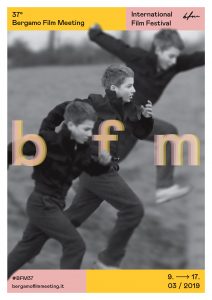
Bergamo Film Meeting unveils its 37th edition from March 9 – 17, 2019 in the mountain side venue just north of Milan in the Italian Dolomites. Bergamasco is one of Italy’s most intriguing dialects and the town boasts a wealth of gourmet restaurants and bars where you can savour saffron-flavoured risottos and a legendary pancetta laced pasta dish called casonelli alla bergamasca in a rich butter sauce accompanied by the local wines, including the famous red Moscato di Scanzo. Local handmade ice creams are based on regional ingredients, with stracciatella a speciality.
To open this year’s festival there will be a live performance of Fritz Lang’s METROPOLIS on Friday 8th March, 20.30, Ex Chiesa di Sant’Agostino – P.le Sant’Agostino, Bergamo.
During the nine screening days and more than 180 films among feature films including world premieres, docs and short-films
COMPETITION EXHIBITION
Dedicated to new auteurs, the International competition will premiere 7 feature films, which will compete for the Bergamo Film Meeting Award (the audience will grant 5,000 euros to the best three films) and, from this year, for the Best Director Award (the International Jury will grant 2,000 euros to the best director). The competition line-up includes three debut features: British director Jamie Jones’ Obey; Holy Boom, which won an award at Zaragoza festival for Greek filmmaker Maria Lafi; Hadrian Marcu’s A Decent Man and Balkan feature Raindrops, Borders from Nikola Mijovic. Also in competition are two winners from last year’s San Sebastian festival: Benjamin Naishtat’s gripping Argentinian thriller Rojo. The Snatch Thief from Agustin Toscano. Richard Billingham’s multi-awarded biopic Ray & Liz,
CLOSE UP
Dedicated to documentary cinema. Two awards will be assigned: the Best Documentary CGIL Bergamo – Close Up Section (the audience will grant 2,000 euros) and the CGIL Jury Prize (the CGIL Bergamo trade union delegates will grant 1,000 euros).
EUROPE, NOW!
The complete works of two filmmakers who, in the last few years, have portrayed Europe’s varied aspects through a uniquely personal vision: the Norwegian BENT HAMER (10001 Grams) and the Spanish director ALBERTO RODRÍGUEZ (Marshland) along with his collaborator RAFAEL COBOS, will be guests of the Festival from March 13 to 16.
RETROSPECTIVES
JEAN-PIERRE LÉAUD. The renowned actor will be a guest of the Festival to mark this tribute to his film canon. The retro includes I Hired A Contract Killer; La Chinoise; L’amour en Fuite, La nuit americaine, Le depart, Les quatre cent coups, Masculin et Feminin, Porcile, La mort de Louis XIV, La mama et le putain.
Also joining the celebration will be Macedonian director and cinematographer Karpo Godino as part of THE YUGOSLAVIAN BLACK WAVE: Retro of his work.
Polish director, animator, painter, cartoonist and performer MARIUSZ WILCZYŃSKI will also join to take part in the festival.
TRIBUTE to PETER MULLAN
PASOLINI AND THE ARABIAN NIGHTS, special event consisting of a photo exhibition, a panel discussion and the screening of three restored films: Il fiore delle Mille e una notte (Arabian Nights, 1974), Le mura di Sana’a (The Walls of Sana’a, 1971) and Appunti per un film sull’India (Notes for a film about India, 1968)
https://www.bergamofilmmeeting.it/
